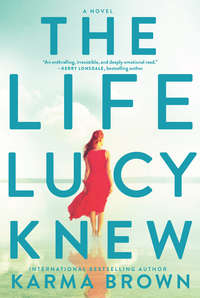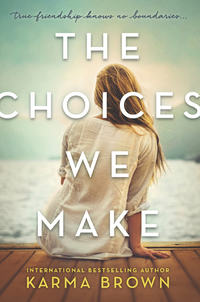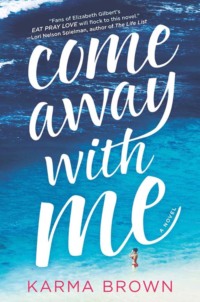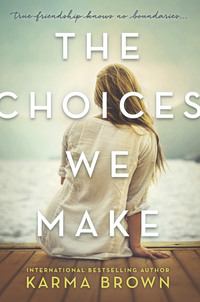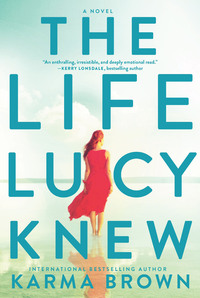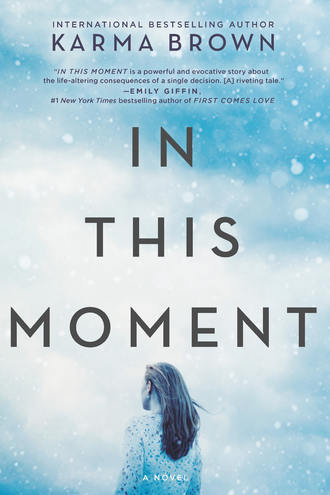
Полная версия
In This Moment

Bestselling author Karma Brown is back with a morally infused and emotionally riveting exploration of one woman’s guilt over an unexpected—yet avoidable—tragedy
Meg Pepper has a fulfilling career and a happy family. Most days she’s able to keep it all together and glide through life. But then, in one unalterable moment, everything changes.
After school pickup one day, she stops her car to wave a teenage boy across the street...just as another car comes hurtling down the road and slams into him.
Meg can’t help but blame herself for her role in this horrific disaster. Full of remorse, she throws herself into helping the boy’s family as he rehabs from his injuries. But the more Meg tries to absolve herself, the more she alienates her own family—and the more she finds herself being drawn to the boy’s father.
Soon Meg’s picture-perfect life is unravelling before her eyes. As the painful secrets she’s been burying bubble dangerously close to the surface, she will have to decide: Can she forgive herself, or will she risk losing everything she holds dear to her heart?
KARMA BROWN is an award-winning journalist and author of the bestsellers Come Away with Me and The Choices We Make. In addition to her novels, Karma’s writing has appeared in publications such as Redbook, SELF and Chatelaine. Karma lives just outside Toronto with her husband, daughter and their labradoodle, Fred. In This Moment is her most recent novel.
www.KarmaKBrown.com
Also By Karma Brown
Come Away with Me
The Choices We Make
In This Moment
Karma Brown

Copyright

An imprint of HarperCollins Publishers Ltd.
1 London Bridge Street
London SE1 9GF
First published in Great Britain by HQ in 2018
Copyright © Karma Brown 2017
Karma Brown asserts the moral right to be identified as the author of this work.
A catalogue record for this book is available from the British Library.
This novel is entirely a work of fiction. The names, characters and incidents portrayed in it are the work of the author’s imagination. Any resemblance to actual persons, living or dead, events or localities is entirely coincidental.
All rights reserved under International and Pan-American Copyright Conventions. By payment of the required fees, you have been granted the non-exclusive, non-transferable right to access and read the text of this e-book on-screen. No part of this text may be reproduced, transmitted, down-loaded, decompiled, reverse engineered, or stored in or introduced into any information storage and retrieval system, in any form or by any means, whether electronic or mechanical, now known or hereinafter invented, without the express written permission of HarperCollins.
Ebook Edition © January 2018 ISBN: 9781474083591
Praise for the novels of Karma Brown
“We adored Come Away with Me and are ready for more of Brown’s powerful, heartfelt prose. She’s the female Nicholas Sparks.”
—Redbook
“Brown delivers an emotional punch in The Choices We Make. This is a good, old-fashioned tear-jerker of a book.”
—The Toronto Star
“The Choices We Make presents gut-wrenching questions about friendship and loyalty... Should appeal to readers who relish Nicholas Sparks’ sentimental stories combined with the kind of weighty issues often raised by Jodi Picoult.”
—New York Journal of Books
“A warmly compelling love story [and] deeply moving debut.”
—Booklist
“A compelling premise with a plot that intensifies satisfyingly in the second half, this book is a good bet for readers who don’t shy away from difficult moral questions.”
—Kirkus Reviews
“[A] beautifully written story of love and loss... Come Away with Me had me smiling through my tears.”
—Tracey Garvis Graves, New York Times bestselling author of On the Island
“[A] heartbreaking yet hopeful tale... Karma Brown is a talented new voice in women’s fiction.”
—Lori Nelson Spielman, #1 international bestselling author of The Life List
“Laughing one minute, then fiercely blinking back tears the next, we tore through this novel—so gripping that we were both excited and scared out of our minds to turn the page. Multilayered and completely consuming...[a] stunning page turner.”
—Liz Fenton and Lisa Steinke, authors of The Status of All Things
“One woman’s journey through grief becomes the journey of a lifetime.”
—Colleen Oakley, author of Before I Go
For Mom & Dad—you told me I could do whatever I put my mind to.
You were right. xo
Contents
Cover
Back Cover Text
About the Author
Booklist
Title Page
Copyright
Praise
Dedication
Quote
Chapter 1
Chapter 2
Chapter 3
Chapter 4
Chapter 5
Chapter 6
Chapter 7
Chapter 8
Chapter 9
Chapter 10
Chapter 11
Chapter 12
Chapter 13
Chapter 14
Chapter 15
Chapter 16
Chapter 17
Chapter 18
Chapter 19
Chapter 20
Chapter 21
Chapter 22
Chapter 23
Chapter 24
Chapter 25
Chapter 26
Chapter 27
Chapter 28
Chapter 29
Chapter 30
Chapter 31
Chapter 32
Chapter 33
Chapter 34
Chapter 35
Chapter 36
Chapter 37
Chapter 38
Chapter 39
Chapter 40
Acknowledgments
Questions for Discussion
A Conversation with Karma Brown
Extract
Remember upon the conduct of each depends the fate of all.
—Alexander the Great
1
I wake with a start thanks to a loud bang against the window on my side of the bed. Without looking I know what’s happened—another bird, tricked by the clear glass of our balcony windows, has soared to its death and snapped me out of my slumber.
Using my fingertips I pull my phone off the nightstand and squint at the clock icon. When I see the time I sit straight up, pulling the covers off Ryan, who groans with annoyance. “Ryan. We have to get up.”
“Five more minutes,” Ryan mumbles, his back to me as he tries to pull the duvet back up over his shoulders.
I nudge him again, tug at the duvet. “Get up. We’re late.”
He rolls toward me, and I hold my phone in front of him. He lets out a quiet string of curse words. “Didn’t you set your alarm?”
“Didn’t you?” I grumble, throwing the duvet off my legs but still not getting out of bed. I feel leaden, like in the night someone replaced my blood with molasses, and my head hurts. Ryan is out of bed and has already started the shower, and my mind drifts again to the bird. Maybe it was only stunned and has already flown away.
I place my feet gingerly on the floor, wiggling some warmth into my toes. Flicking on the balcony light I glance down. Damn. The bird’s neck is torqued at a distressing angle, its feathers ruffling with the breeze, but otherwise there’s no movement in its tiny body.
I contemplate the best way to get rid of it without upsetting Audrey. After the last one broke its neck, a vibrant yellow finch that Audrey buried under our hydrangeas, Ryan refused to let her soap all the windows in the house. So she made glass gel clings, thanks to the internet and twenty dollars of gelatin from the bulk store and a determination to save every last neighborhood bird. I think of the gel clings inside my nightstand drawer, likely sticking to whatever else I’d forgotten about in there, and whisper an apology to the bird.
Guilt getting the better of me, I’m about to grab the clings and put them up when the coffee timer beeps a floor below. With sudden clarity I realize what else I’ve forgotten to do. I race down the stairs and groan when I get to the kitchen. The coffeemaker is surrounded by a spreading pool of black liquid and coffee grounds, cascading over the counter’s lip and on to the floor. What the hell is it with this day?
* * *
I’m on my hands and knees mopping up the grungy coffee when Ryan comes into the kitchen, tucking his shirt into his pants and looking fresh and well-rested, especially in comparison to me—disheveled in my pajamas and unruly, finger-swept bun. “What happened?”
“I forgot to empty the carafe before I set the timer last night,” I say.
Ryan steps around the mess and me, and opens the fridge door. “That’s not like you.”
I pause midwipe, give him a look that suggests he’s said enough. He holds his hands up, giving me the smile that makes it hard to stay irritable.
“Oh, also, there’s a dead bird on our balcony.”
“I guess Audrey’s sticky things didn’t work?” he asks.
“They might work. If I actually put them up.” I scowl and he chuckles. I set a mental reminder to put the window clings up tonight after work. Then I let out three sneezes in quick succession, which is when I realize how sore my throat is.
Ryan glances at me, fridge door open and orange juice in hand. “You getting sick?”
“Allergies.” I stand to wring the brackish coffee-drenched cloth out in the sink.
He juggles the orange juice with the carton of eggs, and nudges the door closed with his hip. Placing the eggs on the counter beside the stove, he lays a hand against my forehead. “Meg, you’re sick,” he says. Then he kisses me on the lips.
“Ryan!” I shove him weakly with my free elbow. “Now you’re going to get sick.”
“I thought it was allergies?” He smirks, grabs a frying pan from the rack and turns on the stove, the gas flame coming to life with a whoosh. “Maybe you should take the day off. Drink hot water and lemon. Doctor’s orders.” He cracks an egg into the frying pan one-handed, then tosses the shell into the sink before repeating the steps with a second egg, leaving a thick trail of egg white along the countertop as he does. Ryan is a decent cook, but has never learned to clean up as he goes, and somehow I’ve ended up doing most of both. I sigh, run the dishcloth across the counter to wipe up the egg white and then turn on the water and nudge the broken shells into the disposal’s whirling blades until they’re pulverized.
While I refill the coffee machine I fantasize about crawling back into bed, indulging in a day of on-demand movies and copious amounts of tea with honey, and then I picture my calendar. I could do the agreements and marketing plans for my new listings from bed, but everything else—including the four showings I have today—requires me to be dressed and present.
“I wish,” I say. “But houses can’t stage or show themselves.”
“Good thing, otherwise you’d be out of a job,” Ryan says, generously pouring hot sauce on top of his eggs. “What about pushing your showings back a bit? Go in a little late.”
I take a sip of orange juice and wince, the acidity burning my throat. “I told Tom I’d help him out this morning. He’s got an agents’ open house at the McLaren property in a couple of weeks. Remember, I told you about that listing? The one with the tennis court and pool?”
Ryan nods, swallows a bite of egg. “Right. With the nude statues in the garden?”
“The very one.” The home’s owner, a widow with a lot of money and specific tastes, had a thing for bronze statues of naked women in a variety of bizarre poses—Tom and I were currently debating whether to have the statues removed and put in storage before the open house. “Anyway, it’s a major listing, and he’s promised me a chunk if I help him out.”
“How big a chunk?” Ryan asks.
I set my index finger and thumb about an inch apart and squint at the space between them. Ryan pushes back from the table, wiping his face with a napkin. “That hardly seems worth getting out of bed for even when you’re well.”
A prickle of irritation moves through me. I know I’m being oversensitive, and Ryan simply voiced a fact. I’ll probably do most of the work, and Tom will take most of the credit—and the commission. Tom’s reliance on me—calling me on vacation, on my days off, much too late in the evening, and me always taking his calls—has been somewhat of a sore spot between me and Ryan, especially lately as my own client list has grown.
However, as I’ve often reminded Ryan, I owe Tom—so I take his calls when they come in, and help him when he asks. When I tried to reenter the workforce after a decade home with Audrey, my skills stale and as outdated as the plastic-cased Bondi blue iMac I used to craft my resume, Tom and his brokerage gave me a chance when no one else would. I started as his administrative assistant, then got my real estate license, and over the last six years I’ve proven I’m great at selling houses—I’m now in the top one percent of Realtors at the brokerage. But as Ryan has reminded me more than once, I didn’t have to go back to work, his salary plenty to keep us more than comfortable. In some ways it seems like he still sees my career as a hobby, which is incredibly frustrating.
My phone pings at me, and I glance at the screen. Pull dinner out of freezer. “Do you want chicken Marbella or tilapia tacos for dinner?” I ask Ryan. My best friend, Julie Larrington, and I do batch cooking once a month, which makes life a lot easier when I have to work late, like I will be doing tonight. “Or turkey and white bean chili? I have one more of those, I think.” My arms reach deep to the back of the freezer, and I shiver with the cold blast of air on my bare arms.
“Chicken gets my vote.” He swallows the last of his vitamins before grabbing his travel mug to wash it out. “But remember I’m in that conference all day? I won’t be home until eight, eight-thirty.” Ryan’s a radiologist at Massachusetts Memorial Hospital, which is only fifteen minutes from the house. He loves his job, especially the flexibility, but has grown weary of the hospital’s inefficiencies. Today’s conference, for example, is focused on “nurturing internal relationships,” which Ryan says could be covered in sixty minutes but will take ten excruciating hours instead.
There’s a sigh from the kitchen doorway. Our fifteen-going-on-twenty-five-year-old daughter leans against the door with her backpack slung over one shoulder and an amused look on her face—which has more makeup on it than we agreed was appropriate for school. But I think back to my dad’s advice when she was born. “Margaret, not everything should be a battle. Ask yourself, ‘Is this the hill I want to die on?’ I promise you not every hill is battle-worthy.” I decide the makeup hill is not the one I want to die on today.
I miss having my dad nearby, but he and his arthritis escaped Massachusetts’s frigid winters a few years ago for a condo in sunshiny Florida that he shares with a Boston Terrier named Polly, and his second wife, a retired accountant named Carla.
Audrey pushes off the doorframe and walks into the kitchen, the rubber soles of her moccasin shoes squeaking against the hardwood. “Did you say Rabbit Rabbit Rabbit this morning?” Her English class recently did a mythology and folklore segment, where she learned the superstition of repeating the word rabbit on the first day of each month, for good luck.
“No, I did not.” I wish it were that easy to ensure luck, but I keep my pessimism to myself.
“You look, like, really bad,” Audrey says, glancing at me from the fridge.
“Thanks a lot.” Then I see the clock on the microwave and curse under my breath. “Did you eat breakfast?” I ask Audrey, as I gather my phone, wallet and a wad of tissues, stuffing them into my purse. I have exactly fifteen minutes to get ready before I have to take her to school, which means dry shampoo and a ponytail.
“Like, an hour ago. I packed you a lunch, too, because you weren’t up yet.” She grabs my reusable lunch bag out of the fridge, and I see the sticky note on it reading, Mom.
I’m so grateful she’s not the kind of kid I have to drag out of bed in the morning and nag constantly to clean her room, eat properly, do her homework. Audrey has a 4.2 GPA, is the assistant editor of Merritt High’s student newspaper, and volunteers with her friend Kendall at the assisted living center, helping run the senior center’s art program. Sometimes I think she’s better at being an adult than I am. While I rely on multiple calendars and far too many reminders that beep and trill and interrupt me on a daily basis to keep on top of our lives, Audrey seems able to do it with a natural ease.
“Thank you,” I say, kissing her on top of her head and setting the bag beside my purse. “I’ll be right down. Just need ten minutes. Twelve, tops.” I start out of the kitchen, then turn back. “Chicken okay for you tonight, Aud?”
“I don’t eat chicken, Mom,” she says, sitting down now that she knows we’re not leaving right away.
I look from her to Ryan, who shrugs at this news. “Since when?” Audrey recently stopped eating red meat and pork, but so far we’ve managed to keep chicken, turkey and fish on the menu.
She taps on her phone, somehow texting and talking with me simultaneously. “I can just make a sandwich.”
“No, it’s fine. Your dad and I can have the chicken another night.” I rummage around the freezer a bit more. “What about turkey?” She shakes her head. I sigh. “Fish tacos?”
“Sounds good,” she says. Clearly fish haven’t made it to her “animals not to eat” list yet. “As long as they don’t have to numb my mouth.”
I stare at her, bag of fish tacos in hand, a memory niggling at my brain.
“I have a dentist appointment after school? I sent you the calendar reminder last week,” Audrey says.
“Right. Dentist.” I shoot her an apologetic look, and quickly scroll through my calendar. Shit. There it is. I mentally run through my day to figure out how I can be in two places at once—at my last showing and in the school pickup queue. “I didn’t forget. See?” I hold out my phone to show her, but she doesn’t look fooled. “It’s fine. We’ll make it work.” I sneeze again, but don’t get to the tissue box in time.
“Gross, Mom,” she says, disdain on her face. “What’s wrong with you?”
“Allergies,” I reply, blowing my nose.
Audrey shrugs at my response, then leans into Ryan when he bends down to hug her. “Bye, Dad.”
“Bye, pumpkin,” Ryan says. “Have a great day.”
But her attention is already back to her phone, her fingers flying furiously over the keys.
Ryan rubs a ruby-red apple against his thigh, holding the door to the garage slightly open with his other hand. “Meg, why don’t you at least reschedule the dentist? She’s fifteen. Her teeth are perfect.”
“I’ve already rescheduled once, and I’m scared of Dr. Snowden’s receptionist. She’s not kind to serial reschedulers.” I sneeze again. “Guess there’s no chance you could pick her up and take her?”
“Nope.” He shakes his head. “The conference goes until four-thirty, and then I have to do some paperwork.”
“You said the conference was pointless,” I say. “What’s the big deal if you miss the last hour?”
“I’m already missing the last hour,” he says, his tone shifting to one of impatience. “I have a meeting about the clinic, and it was a miracle we could all get our schedules lined up.”
“Another one?” I say, trying to quell my irritation. “Can’t you guys do a conference call or something?” Ryan has been meeting with a few coworkers about starting their own clinic for the past eight months, though there’s been little action on it aside from these get-togethers that seem to take place at inconvenient times. Like when I’ve double booked our daughter’s dentist appointment and a house showing.
“No, we can’t do a conference call. It’s important we’re face-to-face. There’s a lot at stake here, Meg.”
“So you’ve said,” I reply.
He lets his hand holding the apple drop, swallows the last bite, and as he does I see his face change. Harden, like it does when he’s had enough of discussing a particular topic.
“Just reschedule the damn appointment if you can’t get her there. Why are you making me feel like the bad guy here?”
“You’re not the only one with work shit going on,” I say, lowering my voice so Audrey doesn’t hear. “I’ve got a lot happening, too.”
“Then maybe you shouldn’t have booked her dentist appointment for this week.”
We stare at one another, both of us waiting for the other one to give in first, which I do. “Don’t worry about it. I’ll figure it out.” I always do, I want to add.
I walk back through the door and let it slam without waiting for his response, and a moment later hear the garage door open and him pull his car out. This has been happening more often, Ryan and I starting, or ending, our days with an argument. I hate how unsettled I feel when we’re not jibing, and I know we need to talk about it. But lately it seems like we’re both running on hamster wheels—him with work and this new clinic start-up, and me with more clients and responsibilities outside the house—rarely jumping off to spend time together not focused on the logistics of our lives.
“You only have five minutes left,” Audrey says, not looking up from her phone when I walk back into the kitchen.
“I know.” I’m mentally picking out my outfit as I race up the stairs, still frustrated with Ryan and having no clue that later I will forever regret not taking to my sick bed this day.
2
Ten minutes later I find Audrey sitting in the front seat of my car, seat belt on and eyes cast down on her phone. She’s likely texting her boyfriend, Sam Beckett, or Kendall—Julie’s daughter and one of Audrey’s best friends—probably complaining that her snot-filled mom is going to make her late for class.
“Who are you talking to?” I ask, and I don’t have to look at her to know she’s rolling her eyes at my question.
“I’m not talking to anyone, I’m texting,” she replies. She certainly plays the sullen teenager when she wants to, but most days I know it’s more an act than anything else. As if reading my mind, she adds, “Just Sam.” I steal a glance at her while I back out of our garage and catch the small smile that plays on her lips when her phone buzzes again. Sam is Audrey’s first real boyfriend, and while they’ve only been dating six months she’s clearly smitten. I’m equal parts delighted for her to be experiencing the blush of first love, and terrified about what other firsts come with it. “He’s sick and his dad is making him stay home.”


